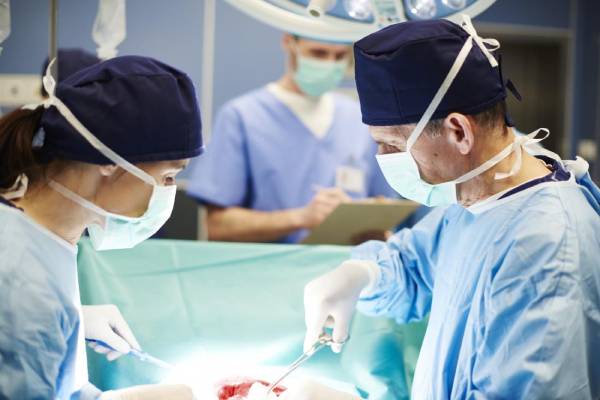- +91 99447 27778 Call Us Now
- sunspecialityclinics@gmail.com Drop Us a Line
Post-Transplant Infections in Coimbatore
Post-Transplant Infections in Coimbatore with Dr. A Murali
Post-transplant infections in Coimbatore,is a life-saving procedure that offers new hope to patients suffering from organ failure. However, it comes with its own set of challenges, one of the most essential being post-transplant infections. After an organ transplant, the immune system is weakened by medications that prevent the body from rejecting the new organ. While these immunosuppressants are vital for the success of the transplant, they also increase the risk of infections, which can significantly affect the surgery’s outcome.
At Sun Speciality Clinic in Coimbatore, Dr. A. Murali, a leading Infectious Disease Specialist in Coimbatore, Tamil Nadu, gives advanced care to Post-Transplant Infections in Coimbatore. With more than a decade of specialized insight in managing infections,
What Are Post-Transplant Infections?
Post-transplant infections in Coimbatore refer to infections that occur following organ transplant surgery due to a weakened immune system. These infections can be caused by bacteria, viruses, fungi, or other microorganisms. They can develop in various parts of the body, including the lungs, skin, urinary tract, and gastrointestinal system. Infections can occur at different stages post-transplant; they can manifest immediately after the surgery, weeks later, or even months down the line.
Common post-transplant infections include:
- Cytomegalovirus (CMV)
- Pneumocystis pneumonia (PCP)
- Fungal infections (e.g., Candida)
- Urinary tract infections (UTIs)
- Hepatitis B and C
- BK virus nephropathy (especially in kidney transplants)

How to Recognize Post-Transplant Infections Symptoms
Recognizing the signs of post-transplant infections in Coimbatore early is crucial for effective treatment. Symptoms of an infection can vary depending on the type and location but may include:
- Fever or chills
- Persistent cough or difficulty breathing
- Unexplained fatigue or weakness
- Pain or discomfort at the transplant site
- Unusual discharge or redness around the surgical incision
- Frequent urination, pain during urination, or foul-smelling urine
If you experience any of these symptoms after your transplant, it is important to contact your healthcare provider immediately to avoid complications.
How Are Post-Transplant Infections Treated?
Post transplant infections are a serious concern for patients undergoing organ transplants, as the immune system is suppressed to prevent organ rejection. Early detection and proper management are crucial for recovery. Common treatments include:
- Antibiotics: Prescribed for bacterial infections.
- Antiviral medications: Used for viral infections such as CMV or BK virus.
- Antifungal medications: Administered for fungal infections like Candida.
- Intravenous immunoglobulin (IVIG): Given to temporarily boost the immune system.
- Adjustments to immunosuppressive medications: In some cases, reducing the dose of immunosuppressants may be necessary to allow the immune system to combat the infection.
Powerful treatment requires a far reaching approach that joins early identification, personalized care, and continuous observing. At Sun Speciality Clinic for Infectious Diseases in Coimbatore, Dr. A. Murali, a leading fever doctor Specialist with more than 20 years of involvement, gives expert treatment to post-transplant contaminations, ensuring the best possible outcomes for his patients.
How Can You Prevent Post-Transplant Infections?
After organ transplantation, the body’s insusceptible framework is smothered to forestall the dismissal of the new organ. While this is necessary for the outcome of the transplant, it also increases the gamble of contamination. Preventing post-transplant contaminations is a crucial part of ensuring long-term health and the legitimate working of the transplanted organ.Follow doctor’s prescribed medication plan, including immunosuppressants.
- Wash your hands regularly to reduce the risk of infection.
- Avoid contact with sick individuals to minimize exposure.
- Keep your transplant site clean and dry to prevent infections.
- Maintain a healthy diet to support your immune system.
- Stay up-to-date with vaccinations recommended by your healthcare provider.
- Limit exposure to crowds, especially in the early stages post-transplant.
- Attend regular follow-up appointments with your transplant team.
- Avoid smoking and excessive alcohol consumption, which can weaken immunity.
- Practice safe hygiene when handling food and water to avoid contamination.
Preventing post-transplant infections is an ongoing process that requires diligence, proper care, and expert guidance. Dr. A. Murali, Best Infectious Disease Doctor is here to help you navigate this journey with personalized care and expert advice.
Why Choose Us?
At Sun Speciality Clinic for Infectious Diseases, we understand the unique challenges associated with post-transplant care. Led by Dr. A. Murali, an expert in infectious disease management with over 20 years of experience, we offer advanced and personalized care to prevent and treat post-transplant infections in Coimbatore. Our dedicated team provides:
- Expertise- In managing complex cases of infections in immunocompromised patients.
- Comprehensive post-transplant care- Including regular monitoring and follow-up to ensure optimal health.
- Access to the latest therapies and protocols- for infection prevention and treatment, ensuring you receive the best care possible.
- A collaborative approach- With transplant specialists to secure the best outcomes for our patients.
With our extensive experience and commitment to patient safety, we strive to provide the highest standard of care for transplant recipients. If you or a loved one is in need of expert management for post-transplant infections in Coimbatore, we invite you to consult with us at Sun Speciality Clinic. Your health and well-being are our top priorities.
Frequently Asked Questions (FAQ's):
Any organ transplant can result in post-transplant infections in Coimbatore, but kidney, liver, heart, and lung transplants are the most commonly affected
Infections can occur at any time after a transplant, but the highest risk for post-transplant infections in Coimbatore is within the first few months
Most post-transplant infections can be treated effectively if diagnosed early. But if neglected it can be life-threatening
In some cases, hospitalization may be required, particularly for severe post-transplant infections in Coimbatore that need close monitoring.
Yes, maintaining good hygiene, staying vaccinated, avoiding exposure to sick individuals

